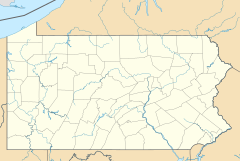Buchanan State Forest
| Buchanan State Forest | |
|---|---|

Sideling Hill Tunnel is now surrounded by Buchanan State Forest
|
|
|
Location of Buchanan State Forest in southcentral Pennsylvania
|
|
| Type | State park |
| Location | Bedford, Franklin, Fulton counties |
| Coordinates | 39°49′55″N 78°32′54″W / 39.83194°N 78.54833°WCoordinates: 39°49′55″N 78°32′54″W / 39.83194°N 78.54833°W |
| Area | 69,703 acres (28,208 ha) |
| Elevation | 2,484 feet (757 m) |
| Created | between 1909 and 1930s |
| Etymology | James Buchanan, 15th President of the United States |
| Owned by | Commonwealth of Pennsylvania |
| Operated by | Pennsylvania Department of Conservation and Natural Resources |
| Open | Yes |
| Camp sites | Yes - primitive |
| Hiking trails | Yes |
| Terrain | Various |
| Website | www |
|
IUCN category VI (protected area with sustainable use of natural resources)
|
|
| Location | McConnellsburg, PA |
Buchanan State Forest is a Pennsylvania State Forest in Pennsylvania Bureau of Forestry District #2. The main office is located in McConnellsburg in Fulton County, Pennsylvania, in the United States. It is named for James Buchanan of Pennsylvania, the fifteenth President of the United States.
The forest is found in the Allegheny Mountains of south-central Pennsylvania and comprises 69,703 acres (28,208 ha) divided into several units located in Bedford, Fulton, and Franklin Counties.
Buchanan State Forest was formed as a direct result of the depletion of the forests of Pennsylvania that took place during the mid-to-late 19th century. Conservationists like Dr. Joseph Rothrock became concerned that the forests would not regrow if they were not managed properly. Lumber and Iron companies had harvested the old-growth forests for various reasons. The clear cut the forests and left behind nothing but dried tree tops and rotting stumps. The sparks of passing steam locomotives ignited wildfires that prevented the formation of second growth forests. The conservationists feared that the forest would never regrow if there was not a change in the philosophy of forest management. They called for the state to purchase land from the lumber and iron companies and the lumber and iron companies were more than willing to sell their land since that had depleted the natural resources of the forests. The changes began to take place in 1895 when Dr. Rothrock was appointed the first commissioner of the Pennsylvania Department of Forests and Waters, the forerunner of today's Pennsylvania Department of Conservation and Natural Resources. The Pennsylvania General Assembly passed a piece of legislation in 1897 that authorized the purchase of "unseated lands for forest reservations." This was the beginning of the State Forest system.
...
Wikipedia

